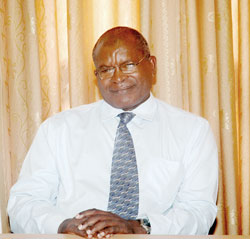The Deputy Ombudsman, Augustin Nzindukiyimana, said that fighting corruption at the grassroots level is the institution’s priority for the next seven years. Nzindukiyimana, who is in charge of preventing and fighting corruption disclosed this yesterday, in an interview.


The Deputy Ombudsman, Augustin Nzindukiyimana, said that fighting corruption at the grassroots level is the institution’s priority for the next seven years.
Nzindukiyimana, who is in charge of preventing and fighting corruption disclosed this yesterday, in an interview.
"It is our priority to fight it at the local government level, and it is a priority of the government,” Nzindukiyimana noted.
He, however, explained that most forms of corruption in local government institutions are ‘bureaucratic’ related.
The 2009-2010 Ombudsman report indicates that 53 percent of the corruption cases were recorded in the local administration.
Unfair dismissal of employees, discrimination and unfair promotions at work places were ranked as the highest forms of corruption registered, and stood at 82.37 percent, according to the same report.
"Fighting corruption has no end, but we are doing it appropriately because we have the political will, which is lacking in many other countries. Our leaders prioritise, among others, fighting corruption, which is the most important tool in fighting the vice,” he added.
Increasing public awareness, Nzindukiyimana said, is one of the methods to be employed in the anti corruption drive.
"Rwandans should consider three things; to refuse, reject and report corruption. We want people to reject and report any form of corruption. But leaders at the grass-roots should also be active in this campaign,” he stated.
In a related development, Nzindukiyimana said that the final report on Rwanda’s implementation of the United Nations Convention against Corruption (UNCAC) instruments will be produced in a meeting to be held in Vienna, Austria in September.
A delegation from UNCAC and United Nations Office of Drug Crimes (UNODC) was in the country, last week, to assess the implementation of the international anti-corruption instruments as requested by the convention such as criminalisation and international cooperation.
It was the first time the international anti-corruption body assessed Rwanda’s implementation process since it was adopted by the UN General Assembly Resolution 58/4 of October 2003 as the first legally binding international anti-corruption tool.
Ends


